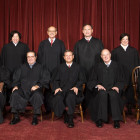
No Quick Fix for Disproportionate School Discipline of Black Students
|
In the wake of a batch of federal data released earlier this year showing minority children are disproportionately disciplined in schools, experts and policy makers say the reasons are complicated and not so easy to explain. But one thing is clear, they say, changing that is going to require a major shift in school philosophy. African-American students make up 18 percent of the pupils in a major U.S. Department of Education Office for Civil Rights survey covering the 2009-2010 school year. But they make up 35 percent of students suspended once, 46 percent of students suspended more than once, and 39 percent of students expelled. “There’s no proven conclusive definitive explanation,” said Michael Harris, a senior attorney for juvenile justice with the National Center for Youth Law in Oakland, Ca.
